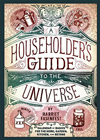 Harriet Fasenfest is a writer, cook, gardener and self-described backyard economist. Her new book, A Householder’s Guide to the Universe: A Monthly Guide on How to Get Back to the Basics and Change the World (Tin House), offers both practical advice for urban homesteading (from gardening and canning to budgeting and cleaning) and Fasenfest’s sharp, sometimes funny, analysis of the current economic and environmental crises. We recommend it to anyone who has felt the satisfaction of growing her own food or thinks she might want to. Reading Fasenfest’s ideas and advice, you can’t help but get caught up in her householding revolution and the notion that it will cure what ails our culture. Fasenfest teaches classes on food preservation and householding at her backyard schoolhouse in (where else?) Portland. We asked her a few questions.
Harriet Fasenfest is a writer, cook, gardener and self-described backyard economist. Her new book, A Householder’s Guide to the Universe: A Monthly Guide on How to Get Back to the Basics and Change the World (Tin House), offers both practical advice for urban homesteading (from gardening and canning to budgeting and cleaning) and Fasenfest’s sharp, sometimes funny, analysis of the current economic and environmental crises. We recommend it to anyone who has felt the satisfaction of growing her own food or thinks she might want to. Reading Fasenfest’s ideas and advice, you can’t help but get caught up in her householding revolution and the notion that it will cure what ails our culture. Fasenfest teaches classes on food preservation and householding at her backyard schoolhouse in (where else?) Portland. We asked her a few questions.
 Most people I know have to work outside the home to pay the bills (and many of them find a lot of satisfaction in their jobs), and many of these same people believe in producing their own food. They keep gardens and/or chickens and dabble in canning and, as you know, it’s a lot, and they’re exhausted. What advice do you have for them? We do and choose what we feel we need to or value. To the extent a 40-hour a week job (or more) is required then I suppose folks will have to enter into this lifestyle in their free time. But, really, I think working 20 hours a week “out there” and the other 20 hours “in here” in our homes, gardens, community, makes for a sane life and one that will permit the powering down some folks are talking about.
Most people I know have to work outside the home to pay the bills (and many of them find a lot of satisfaction in their jobs), and many of these same people believe in producing their own food. They keep gardens and/or chickens and dabble in canning and, as you know, it’s a lot, and they’re exhausted. What advice do you have for them? We do and choose what we feel we need to or value. To the extent a 40-hour a week job (or more) is required then I suppose folks will have to enter into this lifestyle in their free time. But, really, I think working 20 hours a week “out there” and the other 20 hours “in here” in our homes, gardens, community, makes for a sane life and one that will permit the powering down some folks are talking about.
Will you share a few householding ideas from your book for us dabblers? Start with a personal inventory as to why this life might appeal to you. Very often we jump ahead without understanding both the motive and the costs of doing so. Backyard chickens, for example. Folks loved the idea and many still do but the reality of the work, the mess and the aging of our chickens (how many people will do butchering?) is becoming clear. In other words, go slow and be real.For the Garden, if you have one, stand outside in your yard and think about where the sun rises and sets and how it will change over the year. You’d be surprised how few folks know that. Before hacking up the yard, get to know it. Think seriously about what your family likes to eat —fresh or preserved. Are you growing a salad garden for eating in season or a preserving garden for putting up? I talk about all that in the book.
As for the kitchen, look in your cupboards and count the number of boxed cereals or look in the fridge for the number of condiments you’ve collected. It will tell you a lot about the way you choose to set up your stores. Remember, householding (as it relates to the kitchen) is about creating your “stores,” not shopping at theirs.
 Let’s say you’re a bookseller building a display. What other books would you display with A Householder’s Guide to the Universe? Hmmm – I’d go with Sandor Katz’s Wild Fermentation and The Revolution will not be Microwaved; Foods Not Lawnsby HC Flores; David Korten’s Agenda for a New Economy; The Value of Nothing by Raj Patal; Power Down by Richard Heinberg; Radical Homemaker by Shannon Hayes and maybe Christopher Alexander’s A Pattern Language, though that might confuse people (it does apply and might make the display interesting) and maybe some basics cookbook like The Joy of Cooking or Alice Waters’ book The Art of Simple Food.
Let’s say you’re a bookseller building a display. What other books would you display with A Householder’s Guide to the Universe? Hmmm – I’d go with Sandor Katz’s Wild Fermentation and The Revolution will not be Microwaved; Foods Not Lawnsby HC Flores; David Korten’s Agenda for a New Economy; The Value of Nothing by Raj Patal; Power Down by Richard Heinberg; Radical Homemaker by Shannon Hayes and maybe Christopher Alexander’s A Pattern Language, though that might confuse people (it does apply and might make the display interesting) and maybe some basics cookbook like The Joy of Cooking or Alice Waters’ book The Art of Simple Food.
This is a great list. Hey, booksellers, do this!
 Name some things you’ve read lately that have inspired you. As for books, anything by Wendell Berry. I am a groupie. Some Websites I like are The Kitchen Gardeners International; Michael Levenson’s City Farmer News (a great resource for all that is happening all over the world); and, finally, for my daily dose of real news, Democracy Now with Amy Goodman. I wouldn’t take on all of this if I didn’t believe it was a way to stand up to the madness.
Name some things you’ve read lately that have inspired you. As for books, anything by Wendell Berry. I am a groupie. Some Websites I like are The Kitchen Gardeners International; Michael Levenson’s City Farmer News (a great resource for all that is happening all over the world); and, finally, for my daily dose of real news, Democracy Now with Amy Goodman. I wouldn’t take on all of this if I didn’t believe it was a way to stand up to the madness.


Harriet has a great point about working 20 hours a week “out there” and the other 20 “in here” in the home. My husband and I have a large garden, some chickens, a wood stove for which he cuts and brings home all the wood himself, and other modest symptoms of “self-sufficiency.” I do lots of cooking from scratch and not a lot of prepared food.We both find that working part-time and doing our home stuff feels like plenty. I still have mixed feelings about it. It’s a satisfying, sustainable, and ethical life. But we do struggle with being “broke.” I would agree with Harriet’s advice to proceed with caution. You need to know what you are getting into. At the same time, something I think a lot about is how all our needs in life are purchased either with money or with labor. You can often choose which one you want to spend more of. For example, our firewood is obtained for “free” from some friends’ land. But it’s not free–it’s paid for by my husband’s darn hard work. However, I have the security of knowing if the power goes out, we’ll still be warm. It’s worth it.